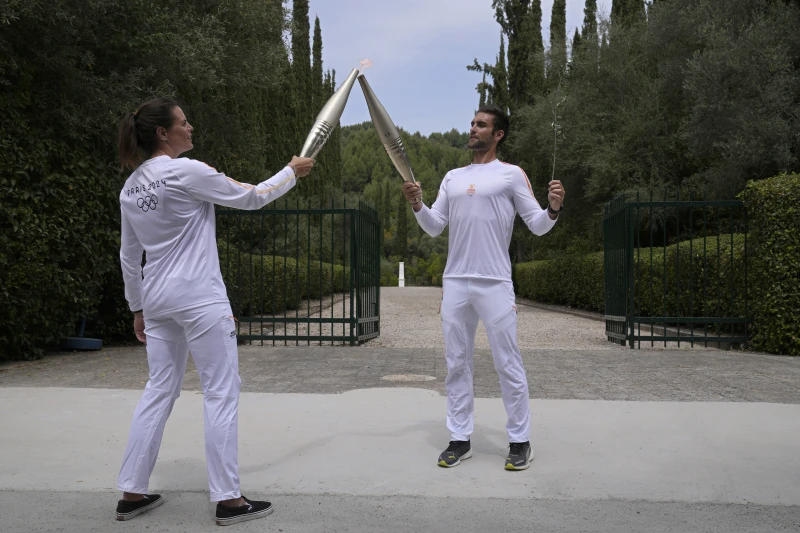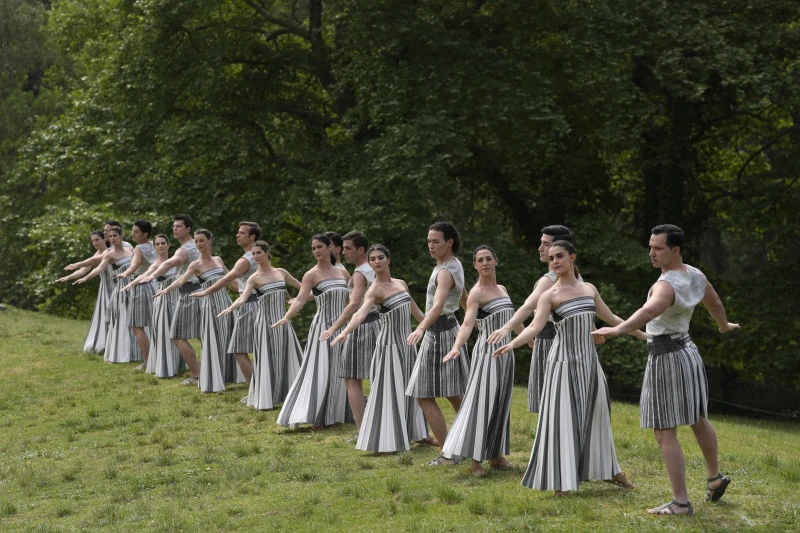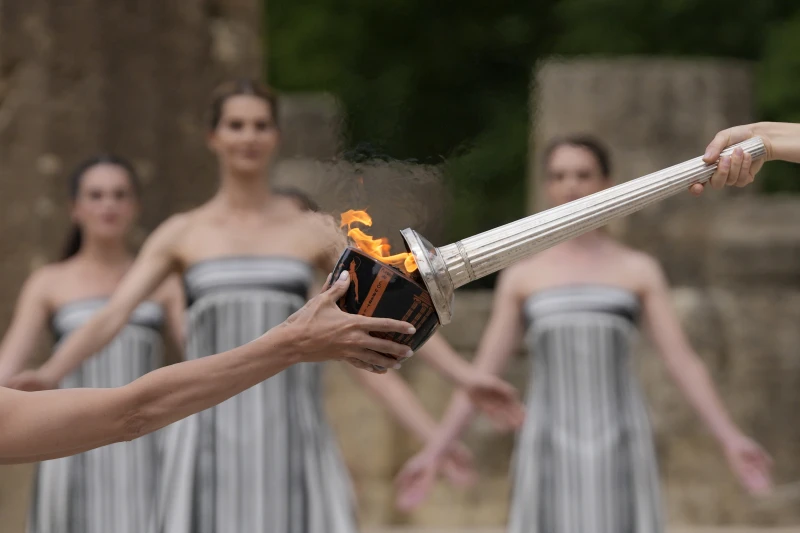The lighting of the flame that is destined to burn at the Paris Olympics, a tradition deeply rooted in the ancient customs of Greece, took place on a momentous Tuesday at the historic site of the ancient games in the serene town of Olympia.
Despite the absence of a clear sky to aid in the traditional lighting ceremony, the flame was kindled with reverence and significance, marking the commencement of a symbolic journey that transcends time and space.
In a scene reminiscent of antiquity, an actress adorned in the attire of an ancient Greek priestess undertook the task of igniting the flame.
Typically, this ritual involves the priestess using the sun’s rays to ignite a silver torch, following a symbolic prayer to Apollo, the revered sun god of ancient Greek mythology.
However, due to overcast skies, the actress resorted to using a backup flame that had been lit the day before during the final rehearsal, foregoing the customary method involving a parabolic mirror that focuses the sun’s rays to spark the fire.
The significance of this event extends beyond mere ceremonial tradition, embodying a profound connection to the past and a hopeful vision for the future.
As the torch is passed from one bearer to another along a 5,000-kilometer route through Greece, encompassing various islands, it symbolizes a continuity of spirit and a shared legacy that transcends borders and generations.
The handover of the flame to the Paris Games organizers in Athens on April 26 will mark a pivotal moment in the journey of the Olympic flame, signifying the global unity and camaraderie that the Games seek to foster.
In the words of International Olympic Committee President Thomas Bach, the flame lighting ceremony serves as both a homage to the rich heritage of ancient Olympia and a testament to the enduring faith in a brighter future.
In a world beset by turmoil and discord, characterized by conflicts and divisions, the yearning for unity and hope becomes ever more palpable.
The gathering of thousands of spectators from diverse corners of the globe at Olympia underscores the universal appeal of the Olympic Games, drawing people together in a shared celebration of athleticism, culture, and human spirit.

The backdrop of the ancient stadium in Olympia, with its majestic ruins and verdant surroundings, provides a fitting setting for this momentous occasion.
Amidst the remnants of temples and sports grounds that once hosted the ancient games from 776 B.C. to 393 A.D., the timeless ritual of lighting the Olympic flame unfolds, bridging the gap between past and present.
The vibrant spring landscape, adorned with blooming Judas trees, delicate irises, and vibrant anemones, serves as a poignant reminder of the cyclical nature of life and the enduring legacy of the Olympic ideals.
As the flame blazes forth, illuminating the hearts and minds of all who witness its glow, it serves as a beacon of hope and unity in a world fraught with challenges and uncertainties.
The journey of the Olympic flame, from its humble origins in Olympia to the grand stage of the Paris Olympics, encapsulates the essence of the Games – a celebration of human potential, resilience, and solidarity.
In the flickering light of the torch, we find a reflection of our shared humanity and a glimpse of a future brimming with promise and possibility.
On Tuesday, the serene grounds of Olympia were enveloped in an air of heightened security as Greek authorities diligently safeguarded the sanctity of the Olympic flame lighting ceremonies.
The backdrop of this vigilance stemmed from the disruption caused by rights activists during the ceremonies, which were intended to mark the commencement of the Beijing summer and winter games.
Amidst armed police meticulously inspecting incoming vehicles for explosives and sniffer dogs meticulously combing the grounds, the symbolic torch was passed from one distinguished athlete to another, each bearing their own legacy and connection to the Olympic movement.
The initial torchbearer, Greek rower Stefanos Douskos, a celebrated gold medalist in the 2021 Tokyo Olympics, carried the flame to a nearby monument housing the heart of the illustrious French Baron Pierre de Coubertin, a pivotal figure in the modern revival of the games.
Following in his footsteps, Laure Manaudou, a French swimmer of great repute, who had previously clinched three medals at the Athens Olympics in 2004, continued the ceremonial relay.
The torch eventually found its way into the hands of Margaritis Schinas, a senior European Union official of Greek descent, signifying the seamless fusion of international cooperation and the spirit of the games.
Amidst the palpable sense of anticipation and unity, the President of the International Olympic Committee (IOC), Thomas Bach, lauded the meticulous preparations undertaken by Paris organizers for the upcoming games, scheduled to take place from July 26 to August 11.
Notably, he underscored the environmental impact initiatives, expressing optimism that the cleanup efforts would render the River Seine swimmable for the first time in a century, a testament to the enduring legacy of the Olympic movement beyond the realm of sport.
However, the undercurrent of politics briefly surfaced in Olympia, as heads of two prominent sports federations voiced their discontent with Sebastian Coe, the leader of track and field, for deviating from Olympic tradition by pledging substantial prize money to gold medalists in Paris.
This move, they argued, could potentially diminish opportunities for athletes worldwide, thereby contravening the egalitarian ethos that has long defined the Olympic spirit.
Furthermore, the impending vacancy in the position of the IOC presidency, set to occur in 2025, has sparked speculation and maneuvering among influential figures within the Olympic sphere, hinting at the intricate web of politics that underpins the global sporting landscape.
From the hallowed grounds of Olympia, the Olympic flame embarked on a journey, departing from the port of Piraeus in Athens on the historic vessel, Belem, a French three-masted sailing ship with a storied legacy dating back to 1896—the year of the inaugural modern games in Athens.
The arrival of the Belem in Katakolo, near Olympia, drew the attention of a fervent group of tourists from Brittany, France, who eagerly waved French and Breton flags, underscoring the enduring international appeal and significance of the Olympic movement.
One such spectator, Jean-Michel Pasquet from Lorient, near Nantes, expressed his profound enthusiasm for witnessing the flame lighting at the historic site of Olympia, emphasizing the unique allure of this timeless tradition.

However, the prospect of attending the Paris Games in person appeared financially prohibitive, prompting him to resign to the idea of experiencing the spectacle from the comfort of his home, a sentiment reflective of the diverse and widespread global audience that the Olympic Games captivate.
In conclusion, the journey of the Olympic flame from Olympia to Paris serves as a poignant reflection of the intricate interplay between tradition, politics, and the universal appeal of international sport.
As the torch passes from one generation of athletes to the next, it symbolizes the enduring spirit of unity, resilience, and camaraderie that transcends geographical boundaries and cultural differences.
Yet, beneath the surface, the realm of international sport remains intertwined with political maneuvering and the pursuit of leadership roles, underscoring the multifaceted nature of the Olympic movement.
Ultimately, as the world eagerly anticipates the commencement of the Paris Games, the resounding message of inclusivity, excellence, and global solidarity embodied by the Olympic flame remains an enduring testament to the unifying power of sport on the world stage.
